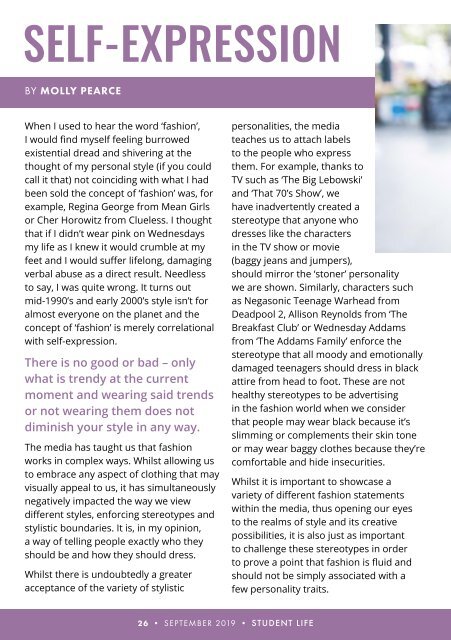Student Life September 2019
You also want an ePaper? Increase the reach of your titles
YUMPU automatically turns print PDFs into web optimized ePapers that Google loves.
SELF-EXPRESSION<br />
BY MOLLY PEARCE<br />
When I used to hear the word ‘fashion’,<br />
I would find myself feeling burrowed<br />
existential dread and shivering at the<br />
thought of my personal style (if you could<br />
call it that) not coinciding with what I had<br />
been sold the concept of ‘fashion’ was, for<br />
example, Regina George from Mean Girls<br />
or Cher Horowitz from Clueless. I thought<br />
that if I didn’t wear pink on Wednesdays<br />
my life as I knew it would crumble at my<br />
feet and I would suffer lifelong, damaging<br />
verbal abuse as a direct result. Needless<br />
to say, I was quite wrong. It turns out<br />
mid-1990’s and early 2000’s style isn’t for<br />
almost everyone on the planet and the<br />
concept of ‘fashion’ is merely correlational<br />
with self-expression.<br />
There is no good or bad – only<br />
what is trendy at the current<br />
moment and wearing said trends<br />
or not wearing them does not<br />
diminish your style in any way.<br />
The media has taught us that fashion<br />
works in complex ways. Whilst allowing us<br />
to embrace any aspect of clothing that may<br />
visually appeal to us, it has simultaneously<br />
negatively impacted the way we view<br />
different styles, enforcing stereotypes and<br />
stylistic boundaries. It is, in my opinion,<br />
a way of telling people exactly who they<br />
should be and how they should dress.<br />
Whilst there is undoubtedly a greater<br />
acceptance of the variety of stylistic<br />
personalities, the media<br />
teaches us to attach labels<br />
to the people who express<br />
them. For example, thanks to<br />
TV such as ‘The Big Lebowski’<br />
and ‘That 70’s Show’, we<br />
have inadvertently created a<br />
stereotype that anyone who<br />
dresses like the characters<br />
in the TV show or movie<br />
(baggy jeans and jumpers),<br />
should mirror the ‘stoner’ personality<br />
we are shown. Similarly, characters such<br />
as Negasonic Teenage Warhead from<br />
Deadpool 2, Allison Reynolds from ‘The<br />
Breakfast Club’ or Wednesday Addams<br />
from ‘The Addams Family’ enforce the<br />
stereotype that all moody and emotionally<br />
damaged teenagers should dress in black<br />
attire from head to foot. These are not<br />
healthy stereotypes to be advertising<br />
in the fashion world when we consider<br />
that people may wear black because it’s<br />
slimming or complements their skin tone<br />
or may wear baggy clothes because they’re<br />
comfortable and hide insecurities.<br />
Whilst it is important to showcase a<br />
variety of different fashion statements<br />
within the media, thus opening our eyes<br />
to the realms of style and its creative<br />
possibilities, it is also just as important<br />
to challenge these stereotypes in order<br />
to prove a point that fashion is fluid and<br />
should not be simply associated with a<br />
few personality traits.<br />
26 • SEPTEMBER <strong>2019</strong> • STUDENT LIFE


















